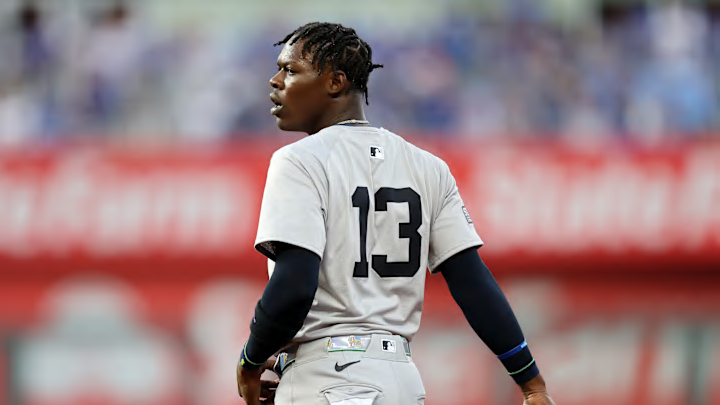The New York Yankees have successfully dispatched the Kansas City Royals three games to one and now await the winner of the Cleveland Guardians and Detroit Tigers series in the ALCS. Jazz Chisholm Jr. didn’t do much with the bat, but he’s been a revelation since they acquired him from the Marlins in July. He has a penchant for clutch hitting and the personality to thrive in New York. Yankees fans love Jazz, and watching him play third base can’t help but bring back fond memories of watching another No. 13 play the hot corner in the Bronx - Alex Rodriguez.
Love him or hate him; there is no other option. A-Rod came over from the Texas Rangers before the 2004 season in a deal that would shift him from shortstop to third base. He played there until he became a full-time DH in 2015. A-Rod’s legacy is complicated - MLB busted him for steroids, he trash-talked Derek Jeter, hit 696 home runs, accumulated over 117 bWAR, and carried the Yankees on his back to a World Series in 2009. Because of the steroids, the Yankees will probably never retire A-Rod's number, and MLB writers will probably never enshrine him in Cooperstown in the Baseball Hall of Fame. Still, fans should recognize how lucky they were to watch the greatest third baseman ever to play.
A lot of people think of A-Rod as a shortstop because he started his career there and was part of the golden age of shortstops, including Derek Jeter, Miguel Tejada, Nomar Garciaparra, Cal Ripken Jr., Jimmy Rollins, and others. It was a group that transformed the position from a light-hitting, defensive-minded spot, and put shortstops at center stage with the rest of Major League Baseball’s premier hitters. Surprisingly, Rodriguez played over 1,000 games at both shortstop and third base, so it's fair to consider him both. Is he really the greatest at his second position?
Alex Rodriguez edges out Mike Schmidt as MLB's greatest third baseman
Most people think Mike Schmidt is the best third baseman of all time, but A-Rod has him beat in home runs, runs, RBI, stolen bases, batting average, slugging percentage, and WAR. They have identical on-base percentages.
Mike Schmidt won more Gold Gloves and was a better fielder, but A-Rod wasn’t lousy. He just never won any awards at third base, maybe because he wasn’t very popular amongst the sportswriters voting for the awards.
People might say Schmidt played fewer games, so he had fewer counting stats. But neither A-Rod nor Schmidt retired at the top of their game; they were no longer formidable hitters by the end of their careers. Hence, it's doubtful that playing more ball would have helped Schmidt catch up to A-Rod.
A-Rod debuted when he was two years younger than Schmidt. Still, it's hard to imagine that a 20-year-old Schmidt would have made any significant contributions because he played 132 games as a 22-year-old and hit under .200. So where are these extra games coming from?
Schmidt fans might argue that the steroids made A-Rod great, but A-Rod was great before steroids. In a full season as a 20-year-old, he hit .358/.414/.631. As a 21-year-old, he went 20/20; as a 22-year-old, he went 40/40. It's impossible to say what A-Rod's career would have looked like had he never juiced, just like it's impossible to know how long he used or when he started, and that is a shame, because Rodriguez was a generational player with or without enhancements. He didn't need to cheat to be great.
He might never get his flowers from the Yankees or MLB, but future generations should at least give him his dues as the greatest third baseman of all time.
